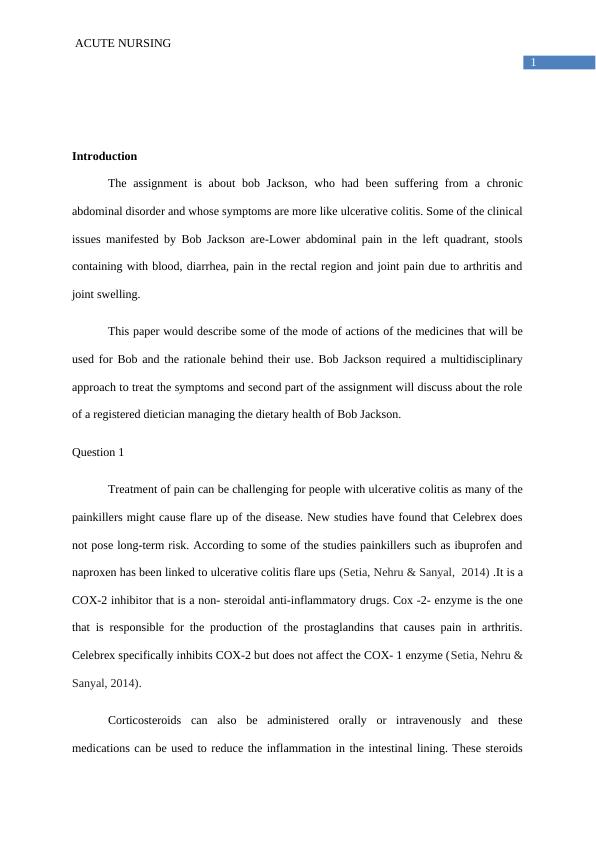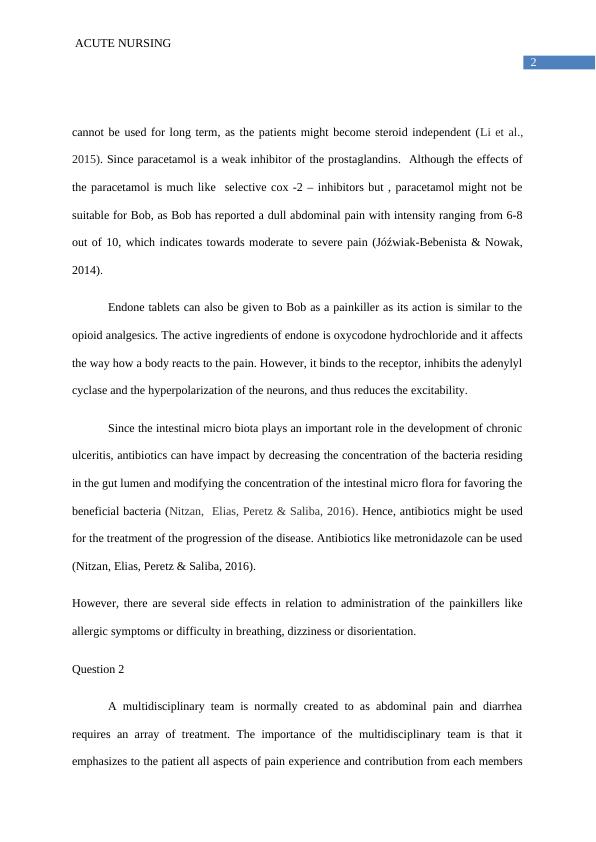Acute Nursing: Treatment of Ulcerative Colitis Symptoms and Role of Registered Dietician
Added on 2023-06-04
7 Pages1627 Words276 Views
Running head: ACUTE NURSING
ACUTE NURSING
Name of the Student
Name of the University
Author Note
ACUTE NURSING
Name of the Student
Name of the University
Author Note

1
ACUTE NURSING
Introduction
The assignment is about bob Jackson, who had been suffering from a chronic
abdominal disorder and whose symptoms are more like ulcerative colitis. Some of the clinical
issues manifested by Bob Jackson are-Lower abdominal pain in the left quadrant, stools
containing with blood, diarrhea, pain in the rectal region and joint pain due to arthritis and
joint swelling.
This paper would describe some of the mode of actions of the medicines that will be
used for Bob and the rationale behind their use. Bob Jackson required a multidisciplinary
approach to treat the symptoms and second part of the assignment will discuss about the role
of a registered dietician managing the dietary health of Bob Jackson.
Question 1
Treatment of pain can be challenging for people with ulcerative colitis as many of the
painkillers might cause flare up of the disease. New studies have found that Celebrex does
not pose long-term risk. According to some of the studies painkillers such as ibuprofen and
naproxen has been linked to ulcerative colitis flare ups (Setia, Nehru & Sanyal, 2014) .It is a
COX-2 inhibitor that is a non- steroidal anti-inflammatory drugs. Cox -2- enzyme is the one
that is responsible for the production of the prostaglandins that causes pain in arthritis.
Celebrex specifically inhibits COX-2 but does not affect the COX- 1 enzyme (Setia, Nehru &
Sanyal, 2014).
Corticosteroids can also be administered orally or intravenously and these
medications can be used to reduce the inflammation in the intestinal lining. These steroids
ACUTE NURSING
Introduction
The assignment is about bob Jackson, who had been suffering from a chronic
abdominal disorder and whose symptoms are more like ulcerative colitis. Some of the clinical
issues manifested by Bob Jackson are-Lower abdominal pain in the left quadrant, stools
containing with blood, diarrhea, pain in the rectal region and joint pain due to arthritis and
joint swelling.
This paper would describe some of the mode of actions of the medicines that will be
used for Bob and the rationale behind their use. Bob Jackson required a multidisciplinary
approach to treat the symptoms and second part of the assignment will discuss about the role
of a registered dietician managing the dietary health of Bob Jackson.
Question 1
Treatment of pain can be challenging for people with ulcerative colitis as many of the
painkillers might cause flare up of the disease. New studies have found that Celebrex does
not pose long-term risk. According to some of the studies painkillers such as ibuprofen and
naproxen has been linked to ulcerative colitis flare ups (Setia, Nehru & Sanyal, 2014) .It is a
COX-2 inhibitor that is a non- steroidal anti-inflammatory drugs. Cox -2- enzyme is the one
that is responsible for the production of the prostaglandins that causes pain in arthritis.
Celebrex specifically inhibits COX-2 but does not affect the COX- 1 enzyme (Setia, Nehru &
Sanyal, 2014).
Corticosteroids can also be administered orally or intravenously and these
medications can be used to reduce the inflammation in the intestinal lining. These steroids

2
ACUTE NURSING
cannot be used for long term, as the patients might become steroid independent (Li et al.,
2015). Since paracetamol is a weak inhibitor of the prostaglandins. Although the effects of
the paracetamol is much like selective cox -2 – inhibitors but , paracetamol might not be
suitable for Bob, as Bob has reported a dull abdominal pain with intensity ranging from 6-8
out of 10, which indicates towards moderate to severe pain (Jóźwiak-Bebenista & Nowak,
2014).
Endone tablets can also be given to Bob as a painkiller as its action is similar to the
opioid analgesics. The active ingredients of endone is oxycodone hydrochloride and it affects
the way how a body reacts to the pain. However, it binds to the receptor, inhibits the adenylyl
cyclase and the hyperpolarization of the neurons, and thus reduces the excitability.
Since the intestinal micro biota plays an important role in the development of chronic
ulceritis, antibiotics can have impact by decreasing the concentration of the bacteria residing
in the gut lumen and modifying the concentration of the intestinal micro flora for favoring the
beneficial bacteria (Nitzan, Elias, Peretz & Saliba, 2016). Hence, antibiotics might be used
for the treatment of the progression of the disease. Antibiotics like metronidazole can be used
(Nitzan, Elias, Peretz & Saliba, 2016).
However, there are several side effects in relation to administration of the painkillers like
allergic symptoms or difficulty in breathing, dizziness or disorientation.
Question 2
A multidisciplinary team is normally created to as abdominal pain and diarrhea
requires an array of treatment. The importance of the multidisciplinary team is that it
emphasizes to the patient all aspects of pain experience and contribution from each members
ACUTE NURSING
cannot be used for long term, as the patients might become steroid independent (Li et al.,
2015). Since paracetamol is a weak inhibitor of the prostaglandins. Although the effects of
the paracetamol is much like selective cox -2 – inhibitors but , paracetamol might not be
suitable for Bob, as Bob has reported a dull abdominal pain with intensity ranging from 6-8
out of 10, which indicates towards moderate to severe pain (Jóźwiak-Bebenista & Nowak,
2014).
Endone tablets can also be given to Bob as a painkiller as its action is similar to the
opioid analgesics. The active ingredients of endone is oxycodone hydrochloride and it affects
the way how a body reacts to the pain. However, it binds to the receptor, inhibits the adenylyl
cyclase and the hyperpolarization of the neurons, and thus reduces the excitability.
Since the intestinal micro biota plays an important role in the development of chronic
ulceritis, antibiotics can have impact by decreasing the concentration of the bacteria residing
in the gut lumen and modifying the concentration of the intestinal micro flora for favoring the
beneficial bacteria (Nitzan, Elias, Peretz & Saliba, 2016). Hence, antibiotics might be used
for the treatment of the progression of the disease. Antibiotics like metronidazole can be used
(Nitzan, Elias, Peretz & Saliba, 2016).
However, there are several side effects in relation to administration of the painkillers like
allergic symptoms or difficulty in breathing, dizziness or disorientation.
Question 2
A multidisciplinary team is normally created to as abdominal pain and diarrhea
requires an array of treatment. The importance of the multidisciplinary team is that it
emphasizes to the patient all aspects of pain experience and contribution from each members

End of preview
Want to access all the pages? Upload your documents or become a member.
Related Documents
Management of Pain and Nutritional Requirement in Ulcerative Colitis: A Case Studylg...
|6
|2411
|305
Case Study on Acute Illness: Medication and Multidisciplinary Teamlg...
|7
|1626
|205
